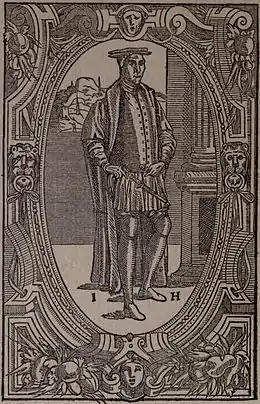John Heywood
John Heywood (1497-1580) est un écrivain anglais connu pour ses pièces, poèmes, et ses recueils de proverbes. Il est né près de Londres, mais est arrivé en Europe pour échapper aux persécutions religieuses en raison de ses opinions catholiques. On pense qu'il est mort à Malines en Belgique). Son fils est le poète et traducteur Jasper Heywood.
John Heywood

| Membre du Parlement d'Angleterre | |
|---|---|
| Membre du parlement d'avril 1554 Lancaster (d) | |
| Membre du parlement de 1554-1555 Hindon (d) |
| Naissance | |
|---|---|
| Décès | |
| Activités | |
| Conjoint |
Joan Rastell (d) |
| Enfants |
Ellis Heywood (d) Jasper Heywood Elizabeth Heywood (d) |
Publications
Pièces
- The Merry Play between Johan the Husband, Tyb his Wife, and Sir John the Priest
- The Mery Play between the Pardoner and the Frere, the Curate and Neybour Pratte (avant 1533)
- The Play called the foure PP; a newe and a very mery interlude of a palmer, a pardoner, a potycary, a pedler (c.1530)
- The Play of the Wether, a new and mery interlude of all maner of Wethers (1533)
- The Play of Love (1533)
- The Dialogue of Wit and Folly
Poèmes
- The Spider and the Flie (1556)
Épigrammes célèbres
- Haste maketh waste. (1546)
- When the sun shineth, make hay. (1546)
- Look ere ye leap. (1546)
- Two heads are better than one. (1546)
- Love me, love my dog. (1546)
- Beggars should be no choosers. (1546)
- All is well that ends well. (1546)
- The fat is in the fire. (1546)
- I know on which side my bread is buttered. (1546)
- One good turn asketh another. (1546)
- A penny for your thought. (1546)
- Rome was not built in one day. (1546)
- Better late than never. (1546)
- An ill wind that bloweth no man to good. (1546)
- The more the merrier. (1546)
- You cannot see the wood for the trees. (1546)
- This hitteth the nail on the head. (1546)
Liens externes
Cet article est issu de wikipedia. Text licence: CC BY-SA 4.0, Des conditions supplémentaires peuvent s’appliquer aux fichiers multimédias.